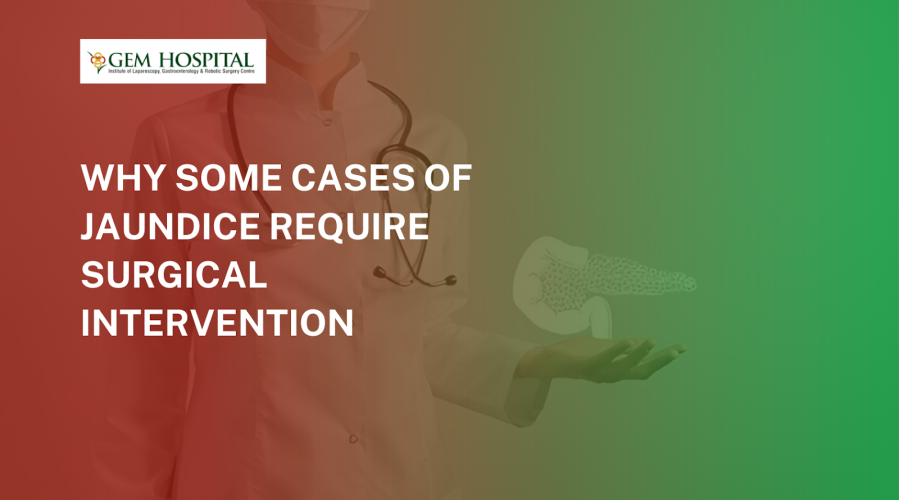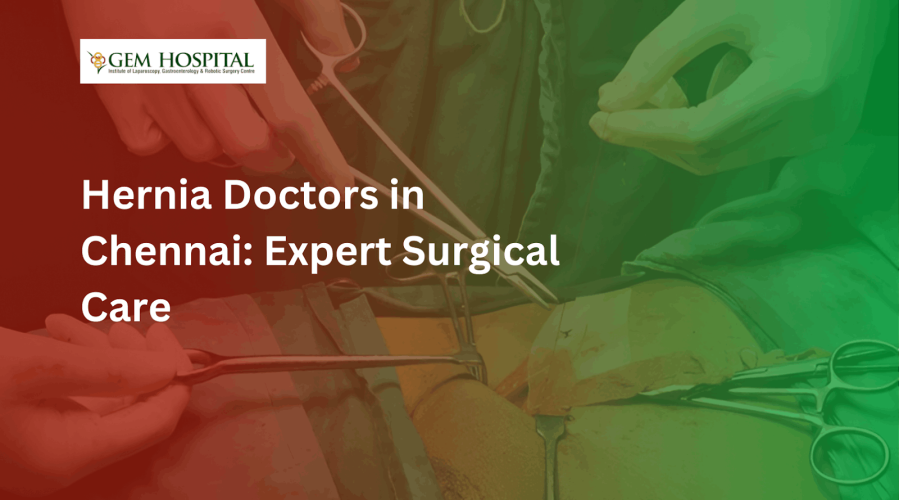Consult experienced hernia doctors in Chennai for expert surgical care. Advanced diagnosis, safe hernia surgery, and faster recovery with specialized treatment.
Why Some Cases of Jaundice Require Surgical Intervention

Jaundice is a condition that causes the skin and whites of eyes to become yellow from the excessive level of bilirubin in the blood. Jaundice is commonly regarded as a sign of liver dysfunction or an infection; therefore, physicians tend to treat it with medical treatment. In cases of jaundice, we often treat with only supportive care and medications, but not all cases of jaundice can be treated with conservative treatment. In cases of more complex and serious causes, the best course of action will be for the surgeon to perform surgery for Jaundice Surgical Treatment.
It is important for patients and caregivers to understand when surgical treatment is called for and how surgery can help treat jaundice. This blog will discuss why certain jaundice requires surgical treatment and what Jaundice Surgical Treatment involves.
When Does Jaundice Indicate a Surgical Problem?
Jaundice itself is a symptom not a disease. Its underlying causes can vary from benign to life-threatening. Most commonly, jaundice arises due to:
- Hepatitis and other liver infections
- Alcoholic liver disease
- Hemolytic anemia
- Obstruction of bile ducts
- Gallstones
- Pancreatic cancer
- Bile duct cancer (cholangiocarcinoma)
It is important for patients and caregivers to understand when surgical treatment is called for and how surgery can help treat jaundice. This blog will discuss why certain jaundice requires surgical treatment and what Jaundice Surgical Treatment involves.
Key Indicators That Surgical Treatment May Be Needed:
- Sudden onset of jaundice accompanied by severe abdominal pain
- Jaundice that is persistent or progressively worsening
- Signs of biliary obstruction seen on ultrasound or MRCP imaging
- Evidence of gallstones in the common bile duct (choledocholithiasis)
- Masses detected in the pancreas or bile ducts
- Recurrent episodes of cholangitis (infection of the bile ducts)
In such scenarios, delaying surgical treatment may lead to serious complications such as bile duct rupture, sepsis, or liver failure.
Common Surgical Interventions for Jaundice
Depending on the cause of the jaundice, the surgical approach will vary. Here are some of the most common surgical treatments used in jaundice management:
1. Endoscopic Retrograde Cholangiopancreatography (ERCP)
This minimally invasive procedure combines endoscopy and fluoroscopy to identify and treat problems in the bile ducts. ERCP is used to:
- Remove bile duct stones
- Place stents in narrowed or blocked ducts
- Dilate strictures
It often serves as the first-line interventional treatment when jaundice is caused by bile duct obstructions.
2. Laparoscopic Cholecystectomy
When gallstones are causing jaundice or recurrent biliary colic, removal of the gallbladder via laparoscopic surgery is usually indicated. This is a safe and effective long-term solution to prevent future biliary problems.
3. Surgical Bile Duct Exploration
In cases where ERCP cannot fully clear stones from the bile ducts or when anatomical abnormalities exist, open or laparoscopic bile duct exploration may be required.
4. Pancreatic or Liver Surgery for Tumors
If a malignant tumor in the pancreas or bile duct is causing obstructive jaundice, surgical resection may be required. This could involve:
- Whipple procedure (pancreaticoduodenectomy)
- Partial hepatectomy
- Bile duct resection and reconstruction
Early surgical intervention in such cancers can dramatically improve survival outcomes.
5. Biliary Bypass Surgery
When tumors are inoperable but still causing bile flow obstruction, surgeons may create a bypass route to restore bile drainage and relieve jaundice symptoms. This improves quality of life even if curative treatment is not possible.
Why Timely Surgical Treatment Matters
Many patients fear the idea of surgery and delay seeking specialist advice when jaundice develops. This hesitation can be dangerous, as untreated bile duct obstruction can lead to:
- Progressive liver damage and cirrhosis
- Severe infections such as ascending cholangitis
- Blood poisoning (sepsis)
- Worsening of underlying malignancy
Prompt evaluation by an experienced hepatobiliary or gastrointestinal surgeon is vital to determine if Jaundice Surgical Treatment is needed and to plan the appropriate intervention.
What to Expect During the Treatment Journey
At centers like Gem Hospital, patients with jaundice undergo a comprehensive workup that typically includes:
- Blood tests to assess liver function
- High-resolution ultrasound or MRCP to visualize bile ducts
- CT or MRI if malignancy is suspected
- Endoscopic evaluation if needed
After we determine what is causing your jaundice to occur, your surgical team will have a discussion with you about the various treatment options, including the risks and benefits of surgery and what your recovery might look like. Most of the time, bile duct stone removals or gallbladder surgeries are being done minimally invasively today and this can lead to faster recovery and fewer complications.
Gem Hospital is known for being able to perform surgeries for more complex tumors by using advanced surgical approaches with supporting oncology and palliative care.
Many patients will not need surgery because a significant part of jaundice can be treated medically. However, certain instances of jaundice in patients will require surgical intervention in order to address their underlying medical condition. If you are experiencing persistent jaundice yourself, or your loved one is experiencing it, and non-invasive imaging has shown there is possibly a bile duct obstruction or that a tumor is found you should not wait longer for a referral for expert surgical intervention. Significant differences can occur depending on how long you wait or refuse to address this condition. Surgical care may prevent you from developing significant complications and possibly even allow you to have a full recovery.
If you or your loved one are facing surgery for jaundice, at Gem Hospital, our hepatobiliary surgeons and medical gastroenterologists are a highly-trained and organized team of doctors that exemplify advanced Jaundice Surgical Treatment in a patient-centered approach. We incorporate advanced technology, minimally invasive procedures and personalized care practices to provide you and your family with the recovery you want and deserve.
You have direct access to advanced treatment options at Gem Hospital, book an appointment today and let the right experts pave the best treatment pathway for you to regain your health with confidence.
Blogs & Article
Get advanced liver transplant treatment in Chennai with expert surgeons, modern technology, and comprehensive care for safe and successful outcomes.
Get advanced piles treatment in Erode with expert doctors. Safe procedures, modern technology, and effective care for fast relief and recovery.


